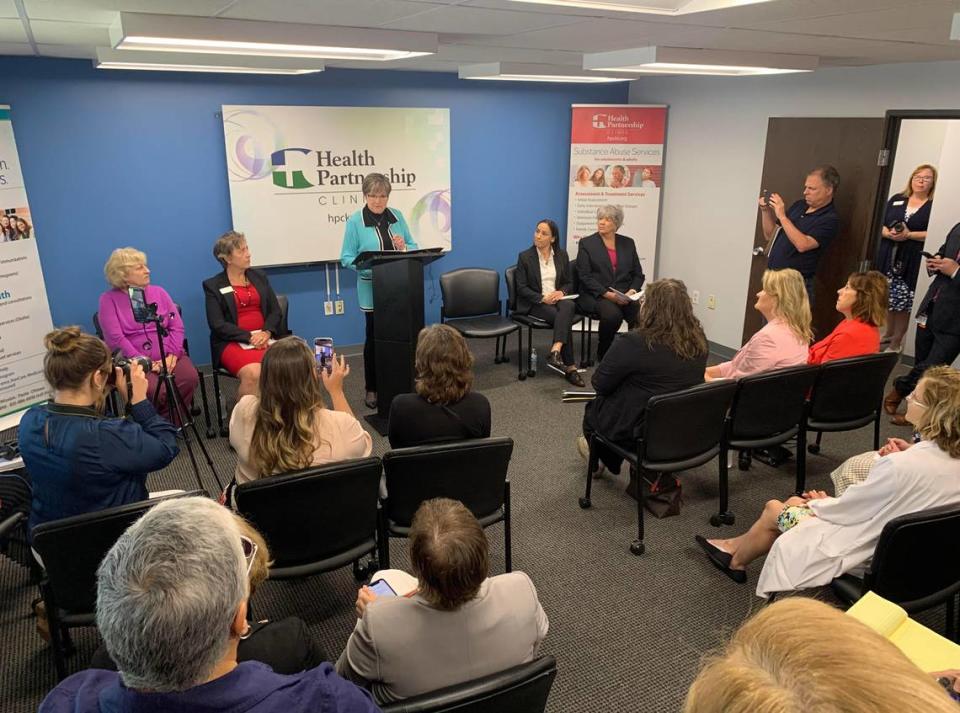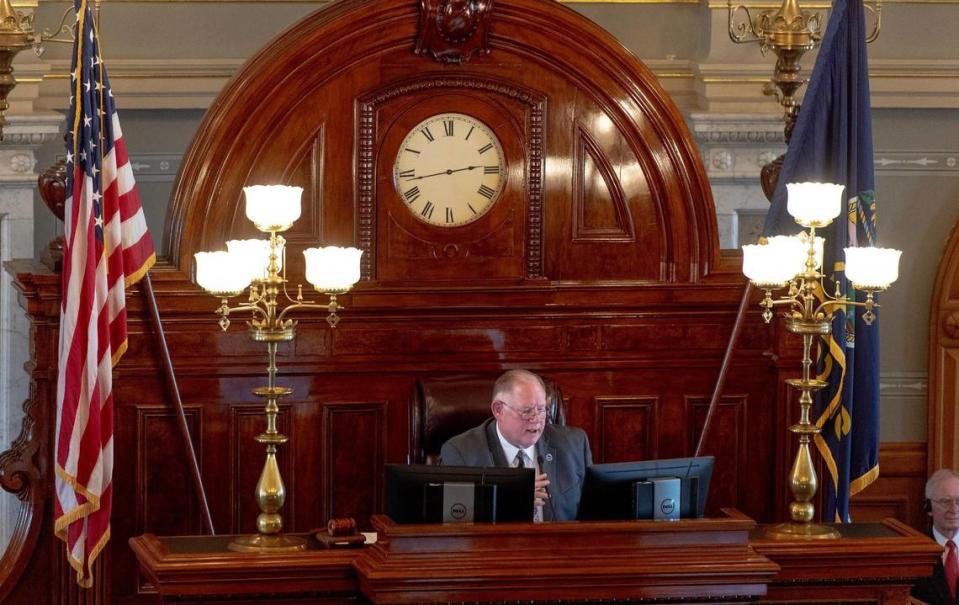Kansas could remove 125,000 people from Medicaid after pandemic. Kelly calls for expansion
- Oops!Something went wrong.Please try again later.
When patients seek care at Health Partnership Clinic, which serves low-income individuals on the Kansas side of the Kansas City metro, they sometimes ask about moving to Missouri.
Some 125,000 Kansans could lose Medicaid coverage over the next year, as state officials begin examining whether enrollees are still eligible after reviews were suspended nationwide during the pandemic. But the state estimates up to 100,000 of those individuals would continue to qualify if Kansas had expanded Medicaid.
In Kansas, Medicaid remains restricted to certain groups, such as pregnant women, low-income families with children and individuals with disabilities. Missouri has expanded Medicaid, however, providing health coverage for those earning up to 138% of the federal poverty line, about $41,400 a year for a family of four.
“All the time, especially where we see patients who have needs beyond the walls of our partnership – that have critical illnesses, need surgeries, things like that,” Health Partnership Clinic CEO Amy Falk said of patients who talk about relocating.
“They bring it up and yes, that is an issue.”
Across the country, millions of people have been allowed to remain on Medicaid during the pandemic regardless of whether their eligibility changed. Medicaid rolls grew dramatically over the past three years in some states as officials held off on ending coverage.
Kansas’ Medicaid program, called KanCare, has more than 500,000 beneficiaries compared to about 400,000 before the pandemic. Missouri’s Medicaid enrollment grew from just under 900,000 in March 2020 to 1.5 million as of March 2023, according to state data compiled by Washington University in St. Louis.
Congress in December passed a budget bill requiring states to once again verify the eligibility of recipients – a process that’s being called the “unwinding” as participants are kicked off. For months, health officials have been scrambling to get the word out to enrollees to give them time to prepare and, if possible, look for alternative coverage.
But in Kansas, the reviews have also become entangled in a years-long fight over Medicaid expansion, which top Republican lawmakers have thwarted for the past decade even as it remains a signature goal of Democratic Gov. Laura Kelly.
A state law, enacted under former Republican Gov. Sam Brownback, requires legislative approval before the governor can expand the program. The policy has effectively tied Kelly’s hands.
While Missouri, with its larger population, stands to lose more recipients than Kansas, the renewal process has particularly frustrated Kansas participants, their advocates and Democrats because many residents would be able to keep their coverage if the state had expanded.
They struggle to see the value of removing these individuals from Medicaid when Kansas is one of just 10 states that haven’t expanded. Taking away coverage will only funnel more individuals into emergency rooms for care that hospitals will never be paid for, further straining the health care system.
“There is an easy fix for this,” Kelly said at a news conference last week to highlight the unwinding. “Expand Medicaid.”
Kelly, who was reelected last year, has introduced an expansion proposal every year she has been in office. The closest one has come to passage was in 2020 when she struck a deal with Jim Denning, an Overland Park Republican who was then the Kansas Senate majority leader. Other GOP lawmakers blocked it, and COVID-19 brought the legislative session to an early end.
“Every year, I tailor the proposal to address concerns expressed by legislative leadership. Every year, they move the goalposts,” said Kelly, who once attempted to pair Medicaid expansion with medical marijuana legalization.
“As a result, Kansas is now a Medicaid desert. Every state around us has expanded Medicaid.”

Expansion blocked by top Republicans
Kelly has signaled that to advance expansion she will need rank-and-file Republicans who support the policy to pressure GOP leadership to allow floor votes. She said that after Medicaid participants complete eligibility paperwork, they should call or write their state lawmakers.
“They should tell their legislators to demand that legislative leadership provide a chance to vote on Medicaid expansion,” Kelly said.
Kansas House Speaker Dan Hawkins, a Wichita Republican, said the eligibility reviews are part of an unwinding of outdated pandemic-era policy that allowed 100,000 “typically ineligible” recipients to continue receiving welfare benefits.
“If a meteor was hurtling toward Kansas, Governor Kelly would use that as an excuse to call for the expansion of Medicaid, so this is very obviously another example of the administration seizing an opportunity to push their agenda,” Hawkins said in a statement.

Republican leaders have offered a variety of objections to Medicaid expansion over the years. A decade ago, concerns often centered on whether the federal government would renege on its financial support for expansion as congressional Republicans sought to repeal the Affordable Care Act, the landmark health care law signed by former President Barack Obama that expanded eligibility. In 2013, the U.S. Supreme Court upheld the law but ruled that states could decide whether to expand without losing existing funding.
The federal government pays 90% of the cost of expansion, while states pick up the rest, but in 2021 Congress included increased financial incentives to non-expansion states as part of a COVID-19 aid package. The Kansas Health Institute, a Topeka-based nonprofit focused on health policy and research, has estimated the new incentives would save about $200 million a year in costs.
As the effort to repeal the federal health law has faded, opponents often voice general fears about growing the size of government and offering aid to able-bodied individuals without children.
“The definition of Medicaid expansion can mean different things to some, but to clarify, the Kelly/Toland Administration’s definition of Medicaid expansion provides welfare benefits to able-bodied adults who choose not to work,” Hawkins said, referring to Lt. Gov. David Toland.
Hawkins said the concept is opposed by a majority of the Kansas House and “when properly explained,” polling shows it is opposed by a majority of voters. Medicaid expansion supporters point to polling showing widespread support for expansion, however.
Missouri voters dismissed similar concerns in August 2020, when they approved Medicaid expansion, 53% to 47%. In the wake of the vote, lawmakers in the Republican-dominated General Assembly threatened to stop expansion by refusing to fund it but ultimately backed down.
The Missouri vote took place because supporters gathered signatures through an initiative petition to place the proposal on the ballot. Kansas has no similar mechanism – only the Legislature can put measures to a statewide vote. Republicans have shown no interest in putting Medicaid expansion before voters.
Hawkins said that instead of expanding welfare, Kelly should focus on “the truly needy who are currently stuck on a waiting list can get the help they need.” That’s a reference to a long-running wait list of Kansans with intellectual and developmental disabilities who have signed up to receive services covered by KanCare.
Advocates for Kansans with intellectual and developmental disabilities largely support expansion, however. They reject the idea of choosing between addressing the wait list and increasing eligibility for Medicaid.
Matt Fletcher, executive director of Interhab, which serves Kansans with intellectual and developmental disabilities, said the loss of coverage for even a single person with a disability because of the unwinding would represent a crisis.
“If even one person loses their eligibility that is a crisis we should all stop and pay attention to and address,” Fletcher said.
Outreach to Medicaid recipients
Without expansion, the Kelly administration has been ramping up its outreach to Medicaid recipients to prepare them for the unwinding — and to limit the number of enrollees who are dropped from coverage simply for not filling out required paperwork.
Kelly and other officials at last week’s news conference repeatedly stressed the importance of enrollees returning eligibility packets within 30 days after receiving them. If they fail to meet the deadline, Kansas may end their eligibility for Medicaid, said Christine Osterlund, deputy Medicaid director and director of operations at the Kansas Department of Health and Environment, which oversees KanCare.
On the other hand, if forms are returned on time, participants can remain in Medicaid while their eligibility is reviewed. Reviews will continue over the next year, and they urged participants to ensure their contact information is up to date.
Missouri officials have shared similar messages about the state’s Medicaid program, called MO HealthNet. The Missouri Department of Social Services last month launched an online portal to assist residents. The portal offers information about eligibility and allows them to submit paperwork online.
“We remain committed to doing everything we can to make sure anyone who is still eligible for MO HealthNet coverage can keep that coverage,” Kim Evans, Family Support Division director at DSS, said in a statement.
Osterlund said KDHE has a site that includes information about eligibility, as well as information health care providers can share with Medicaid enrollees. The page also includes information on the federal health insurance marketplace.
“Unfortunately, there will be families that will lose their eligibility,” Osterlund said.
The Star’s Katie Bernard contributed reporting.

